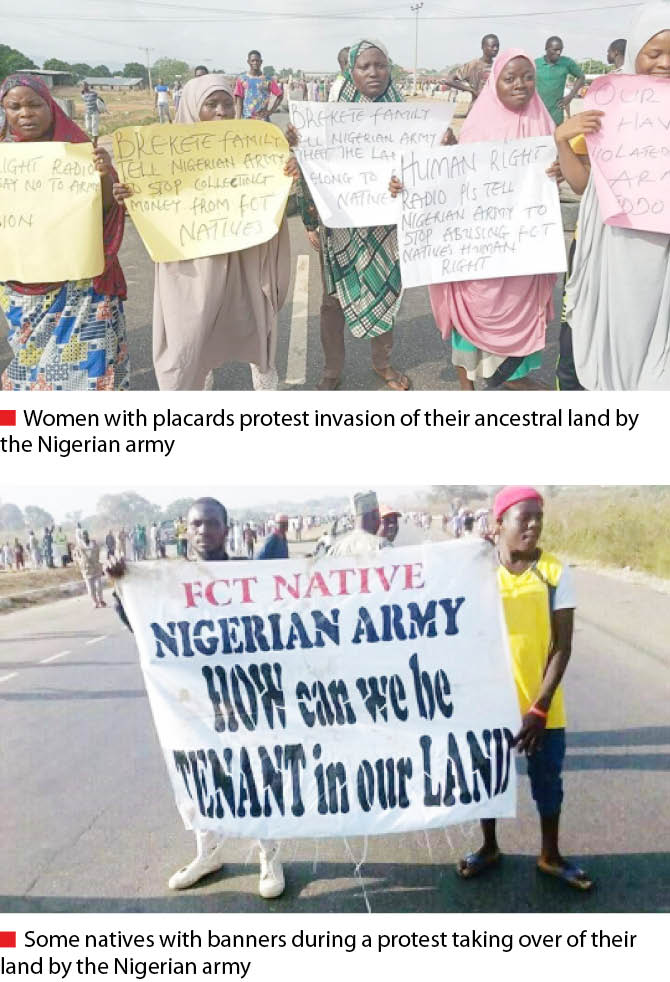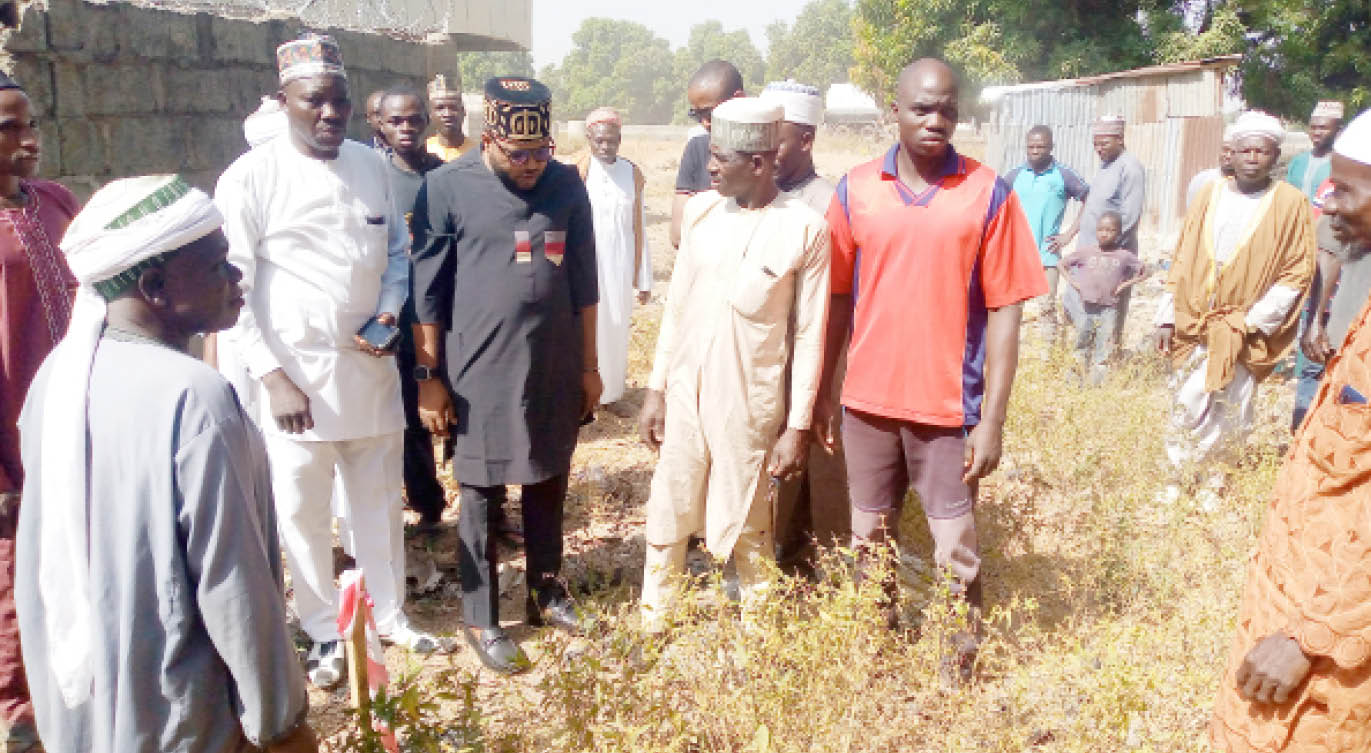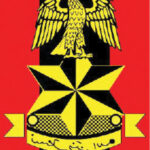The face-off between indigenes of the FCT and the Nigerian military over land ownership started in September 2016, when the military ‘invaded’ Tungan Maje, Kpakuru, Yelwan-Zuba communities located along Gwagwalada-Giri-Zuba on the Abuja-Lokoja highway and started marking the houses of natives for demolition.
The marking of their houses and pulling down of economic trees in their communities did not go down well with the natives of the area, who perceived an alleged move by the military to take over what they said were their ancestral 9,000 hectares of land.
Before the military’s alleged invasion of these communities in 2016, they had mounted signposts from Airport junction-Iddo-Sarki, Anagada – Tungan – Maje down to Zuba, with an inscription boldly written in red and black paints “This Land Belongs To The Nigerian Army Keep Off”.
However, tension started heightening in April 2019, when the natives discovered that the military was moving in equipment such as bulldozers and excavators, and had started clearing the expansive land and digging pit from Iddo down to Tunga Maje.
- New naira notes: Pressure mounts on CBN to extend Jan 31 deadline
- I’ll replace sharing formula with production – Obi
They raised an alarm and wrote petitions to the National Assembly, FCT Administration and the authorities of Gwagwalada Area Council through their youth leader, Comrade Ishaku Umar. They accused the military of intimidating and harassing their people whenever they go to cultivate their farm lands.
As the alleged harassment of the natives continued unabated by military, the natives under the aegis of the Coalition of Abuja Indigenous Association (CAIA) led by its coordinator, Comrade Ezekiel Musa Dalhatu, who is now the commissioner for Public Complaints Commission (PCC) representing the FCT, led protests twice to the National Assembly to lodge their complaints over incessant harassment and intimidation of the natives by the Nigerian army over their farm land.

The natives, during their protests, claimed that the land in question, which is under Zuba chiefdom of Gwagwalada area Council, has been their ancestral land even before Nigeria was created in 1914. Some elders noted that the vast land, which stretches from Iddo Sarki, along Airport Road, down to Zuba, belongs to the natives.
They said they grew up to inherit the land from their forefathers who were into farming and hunting as their major occupations, and so vowed not to relinquish their ancestral land to the Nigerian Army.
Malam Audu Ibrahim, a native of Yelwan Zuba community, said he hardly cultivates his farm because of threats from soldiers who usually invade the land to chase him and other farmers away.
The situation did not also go down well with the Agora of Zuba chiefdom, HRH Alhaji Mohammed Bello Umar, who, at different fora, has decried the alleged incessant intimidation and harassment of his people by military while in their farms.
He said his subjects were deprived of cultivating on their farm lands, alleging that they were most times chased away from their farms by the military.
Also, the district head of Tungan-Maje, Alhaji Hussaini Barde, in one of the interviews with our reporter, maintained that his forefathers settled in the community even before he was born and so wondered why the military will lay claim to ownership of their ancestral land.
“I want to make it categorically clear that we have been in existence even before the decree that established Abuja in 1976. Before the creation of this country in 1914, our people have been here,” he said.
According to him, there are over 25 villages in Zuba chiefdom, which include Sarki Akoro, Bassa, Shishida, Yelwan-Zuba, Jawoji, Malauni, Kpakuru, Tungan-Ali, Epe, Tungan Samu, Anagada, Padna, Tungan-Nara; and “the Nigerian Army is asking indigenes of these communities to relocate.”
He said it’s funny that the Nigerian Army claimed to have acquired the land in 1979, explaining that the decree which created Abuja had outlined that the affected communities should be duly resettled and compensated whenever the need arose.
“In Zuba chiefdom, there are over 25 villages while there are 20 in Jiwa in Abuja Municipal Area Council (AMAC), which the army is claiming belong to them,” he said.
The district head reiterated that the problem started when the Nigerian Army mounted signposts between Iddo Sarki, along airport road, down to Zuba, some years ago.
“Immediately we saw the signposts, what we did as law-abiding citizens was to contact the FCT authorities, who told us that they had not given the land to the Nigerian Army,” he added.
The Nigerian army under the former Chief of Army Staff, Tukur Buratai, was quoted to have claimed that the said land was officially allocated to the army in 1979 while the certificate of occupancy was issued in 2011.
“In 2011, when all lands were revoked and land owners were directed to rectify, the Nigerian army duly applied for the recertification, and they have legally recertified this particular land,” Buratai was quoted to have said during a public hearing at the National Assembly.
However, the FCT administration under the leadership of Muhammad Musa Bello, was said to have denied issuing such land to the Nigerian army. Despite the minister’s denial, the Nigerian army had continued with the building of structures at the site which sparked fresh protest by the natives in August 14, 2020.
The natives, from the six area councils, trooped out in their numbers including women carrying placards and leaves, and blocked the Abuja-Airport Road, as they refused to be intimidated by the gun-wielding soldiers from gaining access to the disputed land. Motorists plying the road, including Vice President Yemi Osinbanjo, who was on his way to the airport, were caught up in the gridlock.
Osinbanjo, who alighted from his convoy and addressed the protesting natives, promised to channel their grievances to President Muhammadu Buhari. A committee was set up by the presidency, with the vice president as chairman. The committee reportedly ordered the Nigerian army to stop any form of development at the site.
Despite the order, the army continued with the building at the site which further resulted in another protest at Tungan Maje, in which one of the youths was allegedly shot dead by soldiers. The situation created tension, drawing the attention of the FCT minister of state, Hajiya Ramatu Tijjani Aliyu, who later visited the palace of the Agora of Zuba, Alhaji Mohammed Bello Umar, to douse tension among the aggrieved natives.
The minister was quoted at the monarch’s palace as saying “if indeed the land was allocated from the federal authorities to the Nigerian army, of course consideration must be made for new place to relocate to and of course to settle you by compensation.”
However, as things stand at the moment, the military authorities have continued with building of structures at the site, even as the youth leader of the affected communities, Comrade Ishaku Umar, disclosed to our reporter on Thursday that some officials from the FCDA have visited some of the communities and took photographs before leaving.
“Actually, some officials from the FCDA came two weeks ago and took photographs before leaving. They assured us that they will get back to us. We are yet to hear from them since then.”

 Join Daily Trust WhatsApp Community For Quick Access To News and Happenings Around You.
Join Daily Trust WhatsApp Community For Quick Access To News and Happenings Around You.

